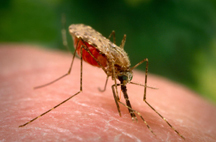
The University of Notre Dame has received a $20 million grant from the Bill&Melinda Gates Foundation to support research aimed at evaluating existing malaria control programs and designing improved methods for malaria control.
The five-year program will be directed by Frank Collins, George and Winifred Clark Professor of Biological Sciences and director of Notre Dames Center for Global Health and Infectious Diseases. The research effort will include partners in Indonesia, Tanzania, Kenya, Uganda and Zambia, as well as researchers from the Swiss Tropical Institute, the U.S. Centers for Disease Control, the London School of Tropical Medicine and Hygiene, and Durham University.
Notre Dames College of Engineering also will play a significant role in the project.
This study represents multiple institutions in multiple countries, carrying out multiple field studies, gathering huge amounts of data, developing appropriate data bases, data analysis and management methods, geographical information systems, maps, data quality assessment, modeling and simulationall activities that will involve, to a very large extent, contributions from the College of Engineering,Collins said.
More than 1 million people die of malaria each year, the vast majority being infants and very young children.
Collins indicated that the consortium will develop and standardize methods for effectively measuring the rates of malaria parasite transmission by mosquitoes.
Well have a whole series of end points, from direct measures of the mosquito carrying the parasite to indirect measures of the rate at which people become infected,Collins said.Theres a huge amount of standardization to be done.
A second research effort will focus on evaluating some of the more standard approaches to malaria control in different settings where the transmission rates are different.
The two most widely used malaria control interventions today are insecticide-impregnated bed nets or houses whose walls have been sprayed with insecticides, more commonly referred to as indoor residual spray,Collins said.Were going to evaluate these interventions in a number of different transmission environments, from really low transmission to really high transmission. And, these interventions themselves will be implemented in multiple different ways.
He points out that bed nets could be given to everyone in a house or to a portion of a village, or only to very high-risk people, such as infants, young children or pregnant women. Similarly, every house in the village could have its indoor walls sprayed, or just some of the houses.
One of the biggest components of our project will be to evaluate such methods in a very rigorous and standardized way and make the information available to the larger malaria control community, so other people can use it,he said.
A third focus of the research is to evaluate the impact of certain kinds of biological phenomena on the interventions themselves.
Were going to be looking at the relationship of biological phenomena, like insecticide resistance or the feeding behavior of the vector and how these phenomena impact the effectiveness of these standardized approaches to control,Collins said.
The project will include test areas in both Africa and Indonesia.
Even though much of it is focused in Africa, well also have a big componentthat will be in Indonesia, which represents a kind of step outside of the standard high transmission zone thats typically looked at in Africa,Collins said.
Involvement in this kind of control program for poor and underserved people of the world is a very appropriate mission for a university like Notre Dame.
_ Contact: Frank Collins, George and Winfred Clark Professor of Biological Sciences, 574-631-9245,_ " frank@nd.edu ":mailto:frank@nd.edu
TopicID: 24566